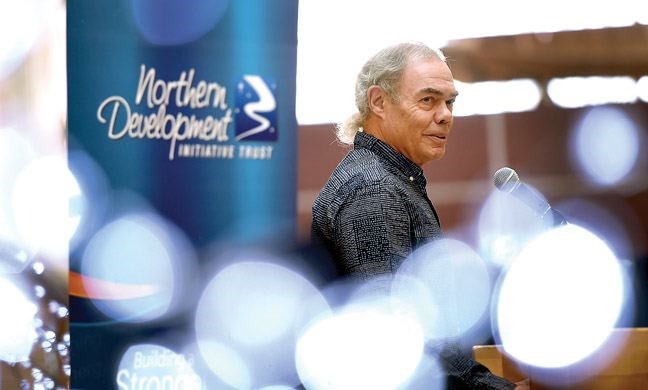The owner of a Smithers-based business that uses cutting edge technology to get in-depth pictures of northern B.C. forests has plenty of kind words for Northern Development Initiative Trust.
Without help from the NDIT's forest innovation fund, Larry McCulloch of L.M. Forest Resource Solutions Ltd. says he would have had a much tougher time getting his venture, centred on a drone equipped with a heat-detecting camera, off the ground.
"A small firm like mine rarely has deep enough pockets to have a significant outlay of research capital," McCulloch said. "It's a pretty big barrier for us."
As such, the initial funding he received from NDIT, as well as the federal government's Industrial Research Assistance Program, "was instrumental."
McCulloch's company was among a dozen small and medium-sized companies that received as much as $50,000 from the fund to cover up to half of a project's budget.
He was front and centre Friday when NDIT hosted an event at College of New Caledonia to launch a second round of searches for similar ventures to support and to showcase the projects it's supported so far.
McCulloch's drone and camera is primarily intended to help combat forest fires.
"We can get temperatures of a fire as it's burning," McCulloch said. "We can also look at an area after a fire's passed through and identify hot spots that still exist and some of those can persist for months.
"They tend to follow the roots underground and they get into stumps. People can't see them but they can flare up when the temperatures and the climate conditions are different."
The information, in turn, is passed on to mop up crews on a "near real time" basis.
A radiometric thermal imager allows the user to identify by the actual temperature to within less than 0.1 degree for every single pixel.
"It's pretty accurate," McCulloch said.
In all, a dozen projects across northern B.C. won NDIT's support through the first round of the program aimed at improving techniques for getting the most out of the region's timber.
Closest to home, Prince George-based Lo-Bar Log Transport secured funding for a steep-slope harvesting method never before used in this region.
"Traditionally, steep-slope logging is a high cost endeavour, said Lo-Bar business manager Marty Hiemstra. "This'll be a safe system to use and be at lower cost.."
NDIT is now accepting applications for a portion of a further $500,000. The program provides a grant equal to as much as half of a project's budget to a maximum of $50,000. Companies must be privately owned, have fewer than 500 employees, annual revenue of less than $100 million and be based within NDIT's service area to be eligible for the funding.



